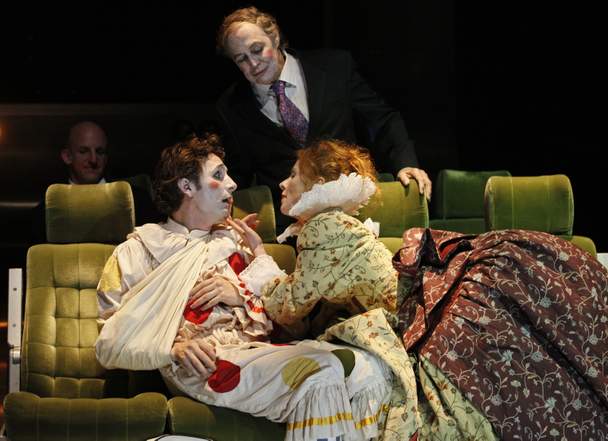Optimism by Tom Wright, after Voltaire
Beneath the thin veil of silliness in Voltaire’s Candide, little escaped his vicious attack: religion, art, politics, theologians, governments, armies and philosophers – especially Leibniz and his theories of the world’s inherent order and goodness – were all shredded to pieces with writer’s weapons of sharp wit, advanced insight and glorious absurdity. Based on the […]
Overview
Beneath the thin veil of silliness in Voltaire’s Candide, little escaped his vicious attack: religion, art, politics, theologians, governments, armies and philosophers – especially Leibniz and his theories of the world's inherent order and goodness – were all shredded to pieces with writer's weapons of sharp wit, advanced insight and glorious absurdity.
Based on the wild trials and tribulations of a wide-eyed boy named Candide who is indoctrinated in the cult of optimism by his tutor Dr Pangloss, the 100-page novella was an instant bestseller across Europe when it was published anonymously in 1759. Since then the story has been routinely revisited through derivative texts, showing up society’s complacency in the face of evils whenever it is told.
Thankfully, Tom Wright’s adaptation stays close to the erratic and unrelentingly OTT plot. True to the original text, the humour is blacker than burnt tar painted in shoe polish at midnight, and the tone dryer than slow roasted chalk left in the Atacama Desert.
Painstakingly detailed accounts are given of the characters being brutally pack raped, sold, abused, partially eaten, forced to watch their loved ones be slaughtered en mass, or getting subjected to natural disaster, war, STDs, slavery, and, worst of all, boredom.
Sound like a barrel of laughs? Actually, it is. With references to circus clowns, Broadway musical, pantomime, marionette and vaudeville, this is a highly entertaining production, reminding us that Voltaire’s humour is aligned with that of slapstick: laughter in the face misfortune.
At its crux is the notion that to live in hope against all evidence is one thing, but to think ‘whatever happens is for the best’ is just irresponsible. The problem with optimists is that if they don’t see what’s wrong with the world they won’t do anything to change it for the better, and with this message Voltaire sowed some important seeds for the French Revolution, which broke out 11 years after his death.
The live music sequences are at times a little awkward but the airhostess-derived choreography for the sombre rendering of Black’s Wonderful Life, led by Amanda Bishop, is a memorable highlight. The performances are generally strong, especially from Barry Otto as the dogmatic Pangloss and Frank Woodly as the sanguine Candide; and Anna Tregloan’s carnivalesque set and costumes propose a semi-familiar world where everything is a bit off.
Directed by Michael Kantor, Optimism is co-produced with Sydney Festival, Melbourne’s Malthouse and Edinburgh International Festival where it opened the theatre program in 2009, winning a Herald Angel Award for Frank Woodley. The production coincides nicely with Leonard Bernstein’s Candide which is showing for free in The Domain at the end of the month as part of Sydney Festival.
Photo by Jeff Busby.





